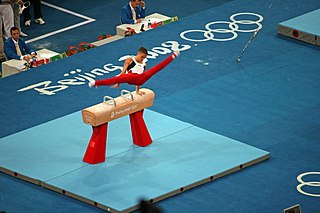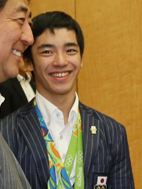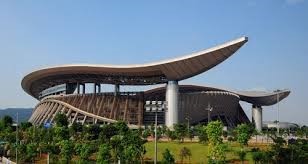
The men's pommel horse competition at the 2008 Summer Olympics was held on August 17 at the Beijing National Indoor Stadium. The eight competitors with the highest scores in qualifying proceeded to the men's pommel horse finals. There, each gymnast performed again; the scores from the final round determined the final ranking. There were 76 competitors from 27 nations that competed on the pommel horse, with nations in the team event entering up to 5 gymnasts while other nations could enter up to 2. The event was won by Xiao Qin of China, the nation's second consecutive and third overall victory in the pommel horse. The other two medals went to nations that had never earned a medal in the event before: Filip Ude of Croatia took silver while Louis Smith of Great Britain finished with bronze.

The men's horizontal bar competition at the 2008 Summer Olympics was held on 9 and 19 August at the Beijing National Indoor Stadium. The eight competitors with the highest scores in qualifying proceeded to the men's horizontal bar finals. There, each gymnast performed again; the scores from the final round determined final ranking. There were 76 competitors from 27 nations that competed on the horizontal bar, with nations in the team event entering up to 5 gymnasts while other nations could enter up to 2. The event was won by Zou Kai of China, the nation's first victory in the horizontal bar. Jonathan Horton won silver, the United States' second consecutive Games with a silver medalist in the horizontal bar. Germany's Fabian Hambüchen won the first of his three medals in the event with bronze.

Kenzō Shirai is a Japanese men's former athlete of artistic gymnastics (AG). Born in Yokohama, Kanagawa, he, a graduate of Kishine High School, joined the Nippon Sport Science University (Nittaidai). Shirai took the team gold, and a bronze on individual vault with the Japanese men's AG (MAG) national team at the 2016 Summer Olympics (OG) in Rio de Janeiro while more major wins were from the World Championships (WC).

The 2014 World Artistic Gymnastics Championships was held in Nanning, China at the Guangxi Gymnasium from 3–12 October 2014. The competition was the fourth time a World Artistic Gymnastics Championships has been held in the continent of Asia.
Qualification for men's artistic gymnastic competitions at the 2016 Summer Olympics was held at the HSBC Arena on 6 August 2016. The results of the qualification determined the qualifiers to the finals: 8 teams in the team final, 24 gymnasts in the all-around final, and 8 gymnasts in each of six apparatus finals. The competition was divided to 3 subdivisions.

The men's artistic individual all-around competition at the 2016 Summer Olympics was held on 6 and 10 August 2016 at the HSBC Arena. Kōhei Uchimura won gold, becoming the first male gymnast in 44 years to do this in two successive Olympic Games. Uchimura also became the second man to earn three all-around medals, matching countryman Sawao Kato with two golds and one silver. Uchimura's victory was Japan's sixth in the men's all-around, tying the Soviet Union for most all-time. His margin of victory was only 0.099, which was less than one small step on landing in terms of gymnastic scoring. It was also his eighth consecutive victory at the top competition of the year. Oleg Verniaiev's silver was Ukraine's first medal in the event since 2000. Max Whitlock's bronze was Great Britain's first since the 1908 Games in London.

The men's vault competition at the 2016 Summer Olympics in Rio de Janeiro was held at the HSBC Arena on 15 August 2016. There were 17 competitors from 14 nations. The event was won by Ri Se-gwang of North Korea, the nation's first medal in the men's vault. Denis Ablyazin repeated as silver medalist, the eighth man to win multiple medals in the event. Kenzō Shirai earned Japan's first medal in the men's vault since 1984 with his bronze.
The women's floor competition at the 2016 Summer Olympics was held at the HSBC Arena on 16 August.

The men's pommel horse competition at the 2016 Summer Olympics was held at the HSBC Arena on 6 and 14 August. There were 71 competitors from 36 nations. The event was won by Max Whitlock of Great Britain, the nation's first gold medal in the men's pommel horse. The nation finished 1–2 in the event, with Louis Smith repeating as silver medalist. It was the first time any nation had earned the top two spots in the event since the Soviet Union swept the medals in 1952. Smith was the second man to win three medals in the event, while Whitlock was the 11th to win two medals.

The men's rings competition at the 2016 Summer Olympics was held at the HSBC Arena on 6 and 15 August. There were 70 competitors from 34 nations. The event was won by Eleftherios Petrounias of Greece, the nation's first medal in the men's rings since 2004. Defending champion Arthur Zanetti of Brazil finished second, making him the 13th man to win multiple medals in the event. Denis Ablyazin earned Russia's first post-Soviet medal in the event with his bronze.

The men's parallel bars competition at the 2016 Summer Olympics was held at the HSBC Arena on 16 August. There were 67 competitors from 33 nations. The event was won by Oleg Verniaiev of Ukraine, the nation's first victory in the parallel bars since 2004 and third overall. Danell Leyva won the United States' first medal in the event since 1996 with his silver; David Belyavskiy's bronze was Russia's first medal in the parallel bars since 2000. China's four-Games podium streak in the event ended.

The men's horizontal bar competition at the 2016 Summer Olympics was held at the HSBC Arena on 6 and 16 August. There were 71 competitors from 34 nations. The event was won by Fabian Hambüchen of Germany, the nation's first victory in the horizontal bar since 1996 and third overall. Danell Leyva won the United States' third silver medal in four Games in the event; Nile Wilson's bronze was Great Britain's first-ever medal in the horizontal bar.
The women's uneven bars competition at the 2016 Summer Olympics was held on 14 August at the HSBC Arena.
The women's balance beam competition at the 2016 Summer Olympics was held at the HSBC Arena on 15 August.

The men's artistic individual all-around event at the 2020 Summer Olympics was held on 24 and 28 July 2021 at the Ariake Gymnastics Centre. Approximately 70 gymnasts from 35 nations competed in the all-around in the qualifying round.

The men's vault event at the 2020 Summer Olympics was held on 24 July and 2 August 2021 at the Ariake Gymnastics Centre. Unlike the other apparatus events, vault requires gymnasts to perform two exercises in order for results to count towards the vault final; most of the gymnasts perform only one or none. Approximately 20 gymnasts from 15 nations competed two vaults in the qualifying round.

The men's floor event at the 2020 Summer Olympics was held on 24 July and 1 August 2021 at the Ariake Gymnastics Centre. Approximately 70 gymnasts from 35 nations competed on floor in the qualifying round.

The men's pommel horse event at the 2020 Summer Olympics was held on 24 July and 1 August 2021 at the Ariake Gymnastics Centre. Approximately 70 gymnasts from 35 nations competed on pommel horse in the qualifying round.
The men's rings event at the 2020 Summer Olympics was held on 24 July and 2 August 2021 at the Ariake Gymnastics Centre. Approximately 70 gymnasts from 35 nations competed on rings in the qualifying round.

The men's horizontal bar event at the 2020 Summer Olympics was held on 24 July and 3 August 2021 at the Ariake Gymnastics Centre. Approximately 70 gymnasts from 35 nations competed on the horizontal bar in the qualifying round.










